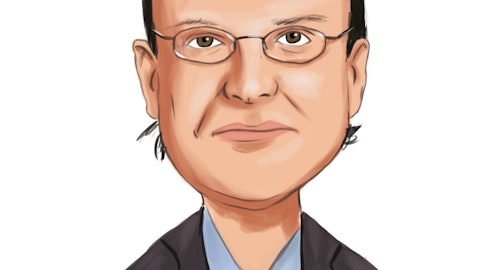Camille Bonnel: Thank you for taking my questions.
Colin Connolly: Thanks, Camille.
Operator: Our next question will come from Vikram Malhotra with Mizuho. Please go ahead.
Unidentified Analyst: Hi. This is George on for Vikram. What are you seeing on the sublease space? And can you comment on any recent impact from work from home dynamics? And how this has changed over the last six months?
Colin Connolly: Sure. I’d say the sublease activity across our markets in the Sun Belt, I’d say third quarter relative to the second quarter have largely been flat. We have not seen an increase in sublease availability. I’d say in certain markets, we’ve actually seen it come down. And that’s been a combination of some of that sublease space actually being leased. And in some instances, customers taking that space off the market, as they rethink their plans. I — as we look at the work from home trends that you mentioned, certainly, a year ago, that was a major secular risk that we were focused on here at Cousins along with the cyclical risks in the economy. I would tell you, as we sit here today, we are far less concerned about the secular risks of work from home and its impacts on trophy lifestyle office in the Sun Belt.
And that’s — we’re certainly seeing that in the headlines. And as I mentioned, the announcements that are accelerating in many of those are — we had a Fortune 500 company in Atlanta just this week that had not been back to work and just announced three days a week. We’ve had a Fortune 500 company here in Atlanta that was three days that just announced they were moving to four days. And I think the consensus among many CEOs for, again, the best — their employees and their professional employees in the highest-quality buildings, it’s going to trend probably four days a week. And I hear that often. And so we’re — I’d say, far less concerned about that today.
Unidentified Analyst: Thanks. And just a last quick one for me. Can you talk about assets that you would like to sell? And where do you see corporates today and I guess, over the next six to 12 months?
Colin Connolly: Again, there’s really not a lot of data points on where cap rates are today. I think we’re still in that process, again, of the market is moving and it’s still fluid. Investors are looking for direction and where interest rates are going before they are probably more willing to place bets. And I think when that stability arrives, you will see investors begin to make bets. And again, I just kind of pivot back for a moment and kind of why do we think investors are going to have confidence to invest in trophy lifestyle office in the Sun Belt. And I think many of those investors are going to look at the experience of Cousins Properties over the course of this pandemic. And if you — Greg highlighted just a few minutes ago that from the start of the pandemic to now, we’ve actually grown our net operating income by 15% and been able to do that while maintaining a fortress balance sheet.
And so it is showing the durability and the stability and the future growth in lifestyle office in the Sun Belt. And so that investor capital will come back. We think it will be firmly focused in the best assets in the best markets. And I think until that time comes, we’re not in a huge hurry at Cousins to pursue dispositions. We’ve got a great balance sheet, no need for near-term liquidity. And so while we’re patient on the acquisitions at the moment, we’re also patient on the dispositions.
Unidentified Analyst: All right. Thank you so much for taking my questions.
Operator: Our next question will come from Anthony Powell with Barclays. Please go ahead.
Anthony Powell: Hi, good morning. A question on tenant improvements. We always hear stories about TI growing in a lot of coastal markets and this cost of leasing space increasing. It doesn’t seem to be a case in your market. So maybe you can talk about TI requirements in your markets and how those evolved in the past few quarters.
Richard Hickson: Sure. This is Richard. I mean we do continue to see some amount of pressure and inflation in construction costs. But certainly, when we’re looking at tenant improvements and how they flow through to our results, those are allowances that we’re giving. They aren’t necessarily indicative of the total project cost. So it is truly a concession and a negotiation in any given deal. And we felt like — and you can see in our results that we’ve been able to manage that and you just look at our net effective rents over time where we’ve had more exposure to the increasing TIs to get leases signed, we’ve been able to actually seek out higher rate to offset that successfully.
Anthony Powell: Got it. Thanks. So maybe on the WeWork, have you entered talks with them about maybe restructuring some of these leases and maybe the exiting earlier so to work on releasing the space? Or is this — or as in related to that to start?
Colin Connolly: Could you repeat the question, Anthony?
Anthony Powell: Yes, WeWork. Have you started to have discussions with them about potentially reworking the leases? Or is it too early for that process to start?
Richard Hickson: This is Richard again. We are under a nondisclosure agreement about the proceedings and what’s going on with WeWork. But — but higher level, yes, we are in dialogue there, an important partner of ours, have been for many years. And as we mentioned earlier, it’s a very fluid situation. It is potentially a bankruptcy situation and a lot can happen. But we are speaking and exploring a lot of different alternatives. .
Anthony Powell: Okay. Thank you.
Operator: And our next question will come from Peter Abramowitz with Jefferies. Please go ahead.


